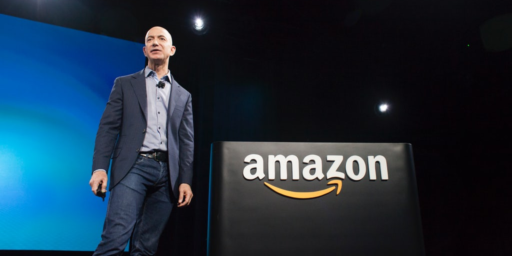Amazon ‘Controls Everything You Watch’
The tech giant is even more powerful than you think.

In this morning’s post examining President Biden’s ‘Promoting Competition’ Order, I observed that “we’ve come to the point where a handful of multinational corporations are more powerful than most countries and need to be reined in, if not broken up.” David Dayen, the executive editor of The American Prospect, provides an illustrative example in “How Amazon Controls Virtually Everything You Watch.” While the title is a skosh hyperbolic, it’s a solid analysis of the company’s reach.
The report is long but here’s the gist:
AWS is the back-end provider for Netflix, Disney+, Hulu, Paramount+, Peacock, HBO Max, Discovery+, and of course, Amazon Prime. As of February of this year, that list includes the top six streaming services in the U.S. by subscribers; Discovery+, which is not on that list, is merging with HBO Max, and Paramount+ didn’t launch until March. Just from those top six, 558.8 million U.S. subscribers rely on AWS to get their streaming video.
[…]
And there’s more: Studios keep their content libraries in the cloud, and they all have deals with AWS for digital distribution of their theatrical releases, which is how most movie theaters receive and show films these days. AWS also provides movie studios with analytics, security, and other features. Even the mini-majors have these kinds of arrangements, including MGM, which has an existing deal with AWS to “modernize its media supply chain.”
And it’s not just movies. About 1,600 television channels worldwide rely on AWS, including the FOX, ViacomCBS, and Discovery families of networks.
Here’s what all this means. If you are watching a filmed piece of entertainment on any screen—at a theater, at home or on your phone through a digital direct-to-customer stream, on a television network, or on a streaming service, the odds are extremely likely that you’re making use of AWS. It has become the backbone of Hollywood.
So Amazon holds two distribution bottlenecks over rival streaming services, TV networks, and movie studios. First, AWS is the primary back-end provider of delivery of media onto people’s screens. Second, Prime Video and Fire TV are supplementary distributors of that media, and any network or service wanting to maximize its audience needs to get onto those channels.
Now, I generally like Amazon and Google, almost certainly the largest of the vertically and horizontally integrated tech giants. My family does an inordinate amount of its shopping on Amazon and much of my life is on Google’s cloud. Amazon, at least, provides remarkably good customer service and value.
Still, it’s undeniable that these firms are incredibly powerful and are using their dominant position to strong-arm competitors. As Biden declared when signing the aforementioned executive order yesterday afternoon, “capitalism without competition isn’t capitalism, it’s exploitation.” That’s not some kooky, socialist position. It’s a founding principle of capitalism literally going back to Adam Smith’s Wealth of Nations.
How is Amazon exploiting its power in this instance?
It’s no accident, then, that a problem arises when entertainment companies negotiate to get what is called “carriage” on Amazon and its associated products like Fire TV. The process can be protracted; it took Disney+ months to get carriage on Fire TV, and it only got it when it agreed to reserve a large chunk of ad space for Amazon. But AWS holds another bargaining chip in these negotiations.
Take the HBO Max/Amazon negotiations. Six months passed before the WarnerMedia service broke through last November with carriage on Fire TV. But the cost of carriage was that WarnerMedia had to extend its existing AWS contract. It’s like a deal between a consumer and cellphone provider where they get a new phone if they extend the cellphone contract a couple of years. That’s good for the consumer, but really good for the company locking in the subscriber; AWS getting WarnerMedia locked up for more years entrenches its monopoly.
Other streamers, including Discovery+, have found their way onto Amazon’s Prime Video Channels. Prime Video Channels is a pretty bad deal for streaming services; while it drives a lot of subscriptions, Amazon keeps 30 percent of the monthly revenue. In exchange for Fire TV carriage, WarnerMedia actually got HBO and HBO Max, which it owns, off of Prime Video Channels, evidence of how unattractive it is to media companies. But given that Amazon runs AWS, and AWS is dominant in delivering video to screens, that clout could be a driver in negotiations that keep companies in Prime Video Channels. Indeed, sources have described Amazon leveraging AWS to force studios to sell through Prime Video Channels.
Now, I would pay the $119 annual fee for Prime simply for the “free” two-day shipping, so getting streaming thrown in is a bonus for me. But, partly because we have seven people in the household over a wide age range, I also subscribe to Netflix, Disney+, Hulu, and HBOMax. And all of those companies are paying money to Amazon, which almost certainly means that I’m paying more than I otherwise would for those services. Moreover, to the extent that AWS becomes more dominant, lock-in becomes inevitable as alternatives disappear. (I don’t have Fire TV but we do rely on Google’s ChromeCast. And their Nest WiFi mesh system.)
Dayen’s piece is much more extensive than my excerpts. Suffice it to say, controlling the distribution of pretty much every movie is just the tip of the iceberg.
Exactly what should be done about this is beyond my expertise. My instinct is that Amazon should not be allowed to be in the business of hosting a movie-making and video distribution service while simultaneously offering a web hosting service for the entire movie industry. But, presumably, there’s a reason that all of Amazon’s competitors decided to use Amazon’s hosting.





Well, seeing as I don’t watch TV, I don’t think Amazon has any control over anything I watch. Which is not to say they don’t make any money off what I watch. I do buy DVDs thru them from time to time.
@James:
Like you, I use a lot of Amazon products (I do have one FireTV, and another with Firestick, but also Roku TVs). But I agree that there is no denying that the company has too much power, but I am not sure what should be done about it.
I also have to wonder, on a tangential matter, how Bezos spending what he is spending on a suborbital flight is a net good for society (and not a symbol of him having too much power in the form of wealth). Perhaps he ought to be paying his employees more (or paying higher taxes).
I recently finished Amazon Unbound. They are rapacious. They destroy sellers on a whim. They’ll destroy your sales and then offer to fix the problem for tens of thousands of bucks. There are stories of Amazon executives who get increasingly troubled by the corporation’s behavior and quit and delete their Amazon accounts.
@Steven L. Taylor: Bezos simply thought since a young age that space was COOL. He justifies it by saying well, we’ll save Earth’s environment by moving all heavy industry to space, which is gibberish.
AWS sounds like AT&T which forms the backbones of all communication. I don’t know if the same sort of regulatory structure that controls AT&T could be created for AWS but it would be interesting to explore that.
@Steven L. Taylor:
To deal with Amazon, I’d start with spinning off AWS and with it the business of hosting and presenting other vendors. AWS will still be a large, powerful player in the cloud computing space, but they wouldn’t be alone as Google and Microsoft are also large players. What makes Amazon so domineering in the market place is the integration of its retail biz to the wholesale/back office biz.
@Chip Daniels:
That is what the breakup of ATT in the early 80’s was. The creation of, I believe, 7 large telcos that would compete. Of course over the years those 7 were allowed to merge and today their are only 3(?) left.
@Chip Daniels: This is a basis for all the discussions around making internet providers “common carriers.” The common carrier concept started around railroads in response to Carnegie’s use of rail transportation to advantage his mining operations over his competitors, who also needed to use his rail systems. The idea is to force those who have all the connections – rail, telephone, internet – to provide carriage to their competitors at the same price and on the same terms that they provide it to themselves so that the monopoly element of delivery is separated (and regulated) from the competitive content they are delivering.
Okay, this is in my professional wheel house, so let me just say: this is a load of crap by someone who completely misunderstands the subject they’re writing about.
It’s like saying “Dominos sells more pizzas than anyone else, so they control what toppings people are allowed to put on pizzas”. If Dominos suddenly decided they were banning pepperoni tomorrow, everyone would just move over to Pizza Hut, so it’s hard to say Dominos dominance creates any sort of “control” over their customers.
Cloud services are the same way. The whole point of cloud services is that the users don’t have to deal with the details of their infrastructure. That also means that if they decide they don’t like what the current provider is doing, they can move their infrastructure over to, say, Microsoft Azure really quick.
Indeed, they don’t even have to be all on one cloud. The transition would probably occur by setting up part of their stuff on the competitor and send, say, 10% of their traffic over there to start out. This would be invisible to the users, and then over the course of a few weeks send 20%, then 30%, etc. over to the competitor until they can shut down the Amazon side.
@Sleeping Dog:
The seven “Baby Bells” were structured so that they couldn’t compete. Each was constrained to specific areas. Each was required to divest any long-distance equipment and service. They weren’t allowed to provide information services. Subsequent buy-outs among them were to gain access to urban markets for local service. The arrangement finally broke down with the introduction of cell technology. Even today, you probably don’t have access to more than one regulated monopoly local landline provider.
@Steven L. Taylor:
I agree he has far too much wealth and from all I’ve read definitely underpays his workers (and treats them badly). But if society is going to allow him to accumulate wealth, his spending it on suborbital flight is arguably better than the common excesses (luxury clothing, foods, cars, yachts, houses, jewelry etc) people do with extra money.
@Steven L. Taylor:
As usual, Elizabeth Warren had a plan for that.
But, she has been caricatured as a radical and a socialist, so we won’t be doing what she proposes.
She also has a plan for Bezos’ ostentatious levels of disposable income. Her latest proposed 3% tax on wealth above 1B wouldn’t keep Bezos from flaunting his exorbitant wealth, but it would generate 6.36B for infrastructure spending. But as you well know, nothing like a wealth tax is going to happen as long as our electoral system favors anti-majoritarianism and there’s no campaign finance reform. Que sera!
@Stormy Dragon:
It’s not that easy. AWS provides a model for purchasing cloud services: computing, storage, geographic distribution, automatic failover, etc. IBM has a model. Microsoft. Google. Hosting companies. You don’t just casually move your software, either service or management, from one cloud to another. Or things like complicated DNS resolution to route traffic based on user location.
The biggest problem the “break up the tech companies” approach will face is that it only works if there’s adequate standardization, broadly adopted. I’m not sure that’s happened since e-mail. I note that the IETF’s attempts to standardize multi-media conferencing years back fell flat: Zoom and Google hangouts and Microsoft Teams certainly aren’t interoperable.
@Michael Cain:
Yeah, it’s not a “push a button and five minutes later you’re somewhere else” thing, but acting like a company the size of Time Warner is “trapped” on Amazon and subject to any demand they make is ridiculous. And it’s a lot more standardized than you seem to think and getting more standardized precisely because customers are increasingly demanding provider agnostic solutions (e.g. a few years ago, pretty much everyone was expected to be able to handle standardized docker containers. Now pretty much everyone is expected to be able to handle standardized kubernetes orchestration of those containers. In a few more years, even more stuff will be standardized based on what developers find to be current sticking points)
At this point Amazon has several horizontal near-monopolies (retail, cloud computing) and is using them to boost their own products (from video content to clothing to computer hardware…)
It like Google with Search and Ads, except way more effective at getting outside their box. Imagine if Google retained a tighter control of Android.
Anyway, Amazon needs to be broken up. At least along product lines (AWS, retail, video…), and then the near-monopolies need to be tightly regulated.
I’m not sure whether splitting AWS in half would be worth it, but it should be considered — two companies with the source code, each with half the physical infrastructure, let them go compete. Depends on whether we are going to be semi serious about regulating anti-competitive behavior.
@Stormy Dragon:
One particular example: Netflix uses a lot of GPL stuff in their backend and under the terms of the license, they have to provide a copy of their source code to any of their users that request it.
So you can, if you want, go download the source code for Netflix’s backend and set up your own “Netflix style service” on a cloud somewhere. Now it won’t have any of the data (e.g. the movies/tv shows or branding) of the real Netflix, but there’s nothing stopping you from putting, say, your cellphone videos in it and giving everyone access to it.
Thing is, it’s not tied specifically to Amazon.
@Gustopher:
It probably would have ended up a failure like Tizen. Google’s lack of control over Android is a big part of why it became so popular.
The other thing I want to point out after a closer reading of the article: the examples it gives are all backward from its thesis.
The thesis is that Amazon is using its dominance in cloud to control what people see on the streaming services, but the examples are all “so-and-so wanted access to Amazon’s users through Amazon TV and Amazon used that to force them into AWS, not so-and-so wanted to use AWS cloud services and Amazon used that to force them to appear on Amazon TV”.
Amazon’s leverage is its user pool, not its infrastructure. Splitting AWS in half isn’t going to change that because the non-Amazon half isn’t going to have that user-pool anymore.
@Michael Cain:
This is a solved problem. There’s an entire industry of CDN providers exist precisely to solve the question of how to get data from your cloud to your users without being locked in to the cloud provider.
@Stormy Dragon:
For Amazon retail, it’s the user pool. For AWS… dramatically less so, and there is less harm in splitting the user pool. There’s no reason to make every account go to AWS-A when splitting AWS into AWS-A and AWS-B. Make AWS-A work to lure customers from AWS-B.
@Sleeping Dog:
I was just about to post the same remedy. Glad you brought it up first. The logical path is to force AWS to be split off as a disconnected entity.
@Gustopher:
That’s an interesting point. Which of AWS-A and AWS-B gets Amazon the retail company as their anchor customer?
Possibly interesting to consider the district court’s initial ruling about Microsoft in the late 1990s (before the new Bush Justice Department put on the brakes): split the company into an operating system company and an application company. The application company would have got Office and Internet Explorer; the OS company Windows but would not have been allowed to build or market applications. Split AWS off and make them earn their own way? Amazon retail decides if they want to stay on the single platform or move some of their business elsewhere?
@George: “But if society is going to allow him to accumulate wealth, his spending it on suborbital flight is arguably better than the common excesses (luxury clothing, foods, cars, yachts, houses, jewelry etc) people do with extra money.”
If only because there’s an infinitesimal chance that his orbital vehicle will collide with Musk’s, and they’ll both burn up in reentry.
@wr:
His spending money (that I completely agree should have been allocated to his very lowly paid and poorly treated workers, or taxed and put towards some sort of public health option for Americans) on technological research could end up helping society to some degree (there are always spin-offs from such things). His spending the same money on the usual luxury goods — clothes, food, cars, boats, planes, houses — won’t have any spin-offs. Many extremely rich celebrities spend their excesses on a fleet of luxury cars or multiple jet planes. So if you’re going to allow that kind of wealth accumulation, then what he’s doing is better than the norm for the filthy rich.
I don’t think this is an appropriate analogy. Amazon isn’t threatening to ban anything. Also, pizza places use mostly public infrastructure–whereas Amazon, Google, and MS all retain ownership of parts of the infrastructure of the internet–the analogy would require Domino’s to own significant stakes in, say, water delivery and roads.
@Stormy Dragon: I endorse this take. With one exception. If Amazon is linking carriage on it’s platforms to hosting on AWS that’s not ok with me. That’s a big problem. It’s the same kind of thing that Microsoft got spanked over viz. Internet Explorer and pre-installs.
The solution to this would be to spin off AWS, which is a very solid business and would do well. and is only kind of loosely tied to their core, retail business. This is a vertical monopoly, so there’s no issue of “break it into 7 regional companies”.
@Jay L Gischer:
Oh, I’m not saying it’s okay and I’m in favor of breaking Amazon up (in fact I’d like a blanket ban on telecom companies owning media companies).
All I’m saying is that I’m not buying the “poor HBO is trapped by AWS!” angle.
I was just thinking though, that under current US anti-trust law, it would be very hard to prosecute Amazon, since I believe one must show that consumers are harmed, and all of this is several steps away from consumers.